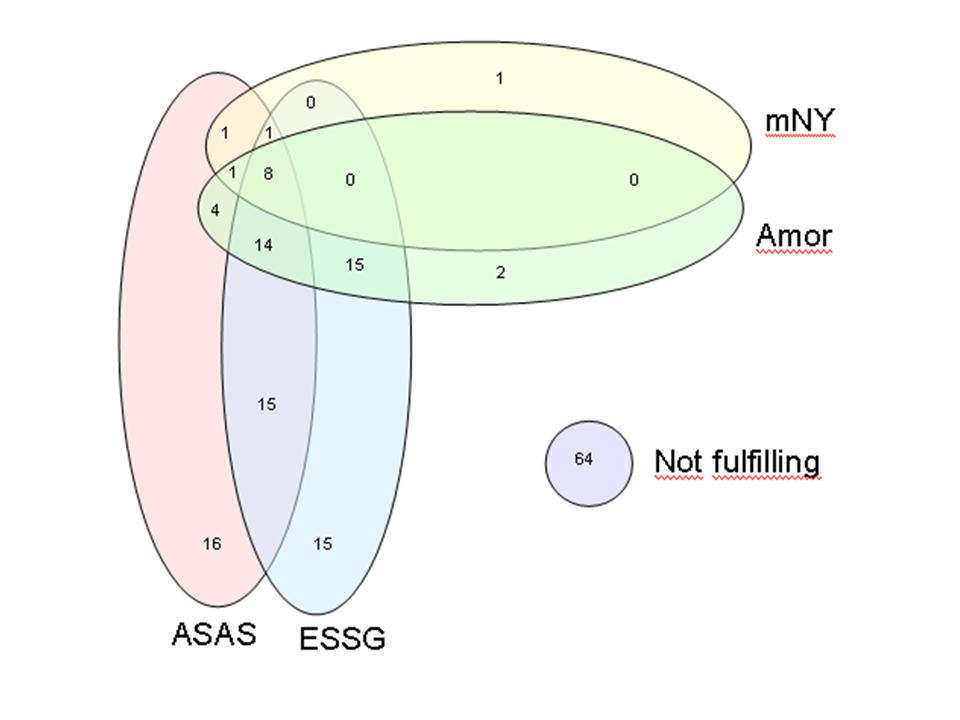Session Information
Session Type: Abstract Submissions (ACR)
Background/Purpose: Chronic back pain is a very prevalent complaint in the general population but only a small proportion of these patients suffer from spondyloarthritis (SpA). Unfortunately, it is not clear when primary care or other physicians should refer a patient with chronic back pain to a rheumatologist. Many rheumatologists fear their practices will be overloaded with patients not having SpA if they have to see all patients with chronic back pain. Some have recommended inflammatory back pain (IBP) as the referral symptom but this is not an ideal criterion since many patients with SpA do not have IBP1.
The purpose of this study is to describe how many patients with chronic back pain referred to the rheumatology outpatient clinic fulfill at least one of the classification criteria sets for spondyloarthritis (SpA).
Methods: We started the SpondyloArthritis Caught Early (SPACE)-project and included all (n=157) patients with chronic back pain (almost daily ≥3 months), starting before the age of 45 years of short duration (≤2 years). Patients were classified according to the modified New York (mNY), European SpA Study Group (ESSG), Amor and ASAS axial SpA classification criteria sets.
Results: In total, 93 (59.2%) patients fulfilled any of the criteria sets. Twelve (7.6%) patients fulfilled the mNY criteria; 68 (43.3%) patients fulfilled the ESSG criteria, 44 (28.0%) the Amor criteria and 60 (38.2%) the ASAS criteria for axial SpA. The overlap of the criteria is presented in the table and the figure. Eight of the 12 patients who fulfill the mNY criteria also fulfilled all the other criteria sets. The one patient only fulfilling the mNY criteria and no other criteria sets has ‘night pain’ as only SpA feature.
Conclusion: Approximately 60% of the patients included in the SPACE-cohort fulfill at least one of the SpA criteria sets; 38% fulfill the ASAS axial SpA criteria. The selection criteria as used in the SPACE-project are easily applicable and work very well. Almost daily chronic back pain of short duration starting before the age of 45 years (in accordance with the entry criterion of the ASAS axial SpA criteria) appears to be a very good and simple referral strategy at a rheumatology department, with a high yield of patients with SpA.
|
Classification criteria sets |
Patients (n) |
|
No criteria set |
64 |
|
Any criteria set |
93 |
|
All criteria sets |
8 |
|
All ASAS |
60 |
|
All ESSG |
68 |
|
All Amor |
44 |
|
All mNY |
12 |
 References: 1van den Berg R. Ann Rheum Dis 2012;71(Suppl3):566
References: 1van den Berg R. Ann Rheum Dis 2012;71(Suppl3):566
Disclosure:
M. de Hooge,
None;
R. van den Berg,
None;
F. van Gaalen,
None;
M. Reijnierse,
None;
T. Huizinga,
None;
D. van der Heijde,
None.
« Back to 2012 ACR/ARHP Annual Meeting
ACR Meeting Abstracts - https://acrabstracts.org/abstract/almost-40-of-patients-with-chronic-back-pain-starting-before-the-age-of-45-fulfill-the-asas-axial-spondyloarthritis-criteria/
